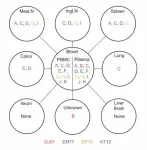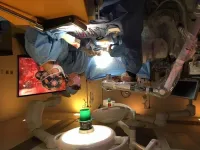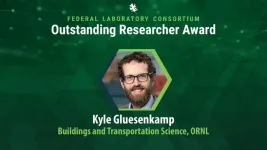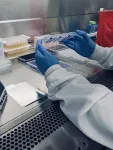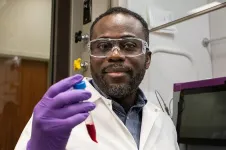(Press-News.org) LA JOLLA (January 22, 2024)—Salk Professor Ronald Evans has been named the 2024 recipient of the Japan Prize in the field of Medical Science and Pharmaceutical Science. The Japan Prize Foundation awards this prestigious international award annually to “express Japan’s gratitude to international society.”
"I am delighted to extend my congratulations to Ron for this well-deserved recognition in honor of his discovery of nuclear hormone receptors,” says Salk President Gerald Joyce. “This accomplishment not only reflects the exceptional caliber of Ron’s research but also underscores the many important contributions he has made to society."
The Japan Prize Foundation honors individuals whose original and outstanding achievements in science and technology have advanced the frontiers of knowledge and served the cause of peace and prosperity for humankind. To date, 108 laureates from 14 countries have received the Japan Prize since the first prize was given in 1985. Each laureate receives a certificate of merit, a commemorative medal, and a monetary prize.
Evans is a professor, the director of the Gene Expression Laboratory, and the March of Dimes Chair in Molecular and Developmental Biology at Salk. His receipt of the Japan Prize recognizes his groundbreaking discovery of nuclear hormone receptors—a large family of molecules that respond to various steroid hormones, vitamin A, and thyroid hormones. These hormones help control sugar, salt, calcium, and fat metabolism, affecting our daily health, as well as treatment of disease. The receptors Evans discovered are now primary targets in the treatment of breast cancer, prostate cancer, pancreatic cancer, and leukemia, as well as osteoporosis and asthma, and more than a dozen approved drugs have been developed using his technology to treat those conditions and more.
As the Japan Prize highlights, Evans continues to make impressive discoveries that improve our scientific understanding of the human body. In 2023, Evans made a number of new discoveries regarding pancreatic and colorectal cancer. In a collaborative study with UC San Diego, he found that high-fat diets can change gut bacteria and alter digestive molecules called bile acids that are modified by those bacteria, predisposing mice to colorectal cancer. In another study, he identified a new set of molecules that fuel the growth of tumors in pancreatic ductal adenocarcinoma (PDAC), the most common type of pancreatic cancer. Most recently, he discovered how a class of anti-cancer drugs called HDAC inhibitors can suppress pancreatic cancer inflammation and “turbo charge” therapeutic response.
"I am deeply honored and humbled to receive the Japan Prize and acknowledge all the colleagues and collaborators that made this possible,” says Evans. “This accolade reinforces our commitment to advancing science along with the translational impact of our research, including more than a dozen approved drugs developed for treating conditions such as leukemia, cancer, liver disease, diabetes, and hypertension. I look forward to continuing this amazing journey to lead research with impact that extends beyond the lab to help improve human health."
Evans earned his BA in bacteriology and PhD in microbiology and immunology from the University of California, Los Angeles, and completed his postdoctoral fellowship at Rockefeller University. He has received such accolades as the Albert Lasker Basic Medical Research Award, the Gairdner Foundation International Award, the Wolf Prize in Medicine, the Keio Medical Science Prize, and the Asan Award in Basic Medicine, among many others. He is a member of the US National Academy of Sciences and the US National Academy of Medicine.
About the Salk Institute for Biological Studies:
Unlocking the secrets of life itself is the driving force behind the Salk Institute. Our team of world-class, award-winning scientists pushes the boundaries of knowledge in areas such as neuroscience, cancer research, aging, immunobiology, plant biology, computational biology, and more. Founded by Jonas Salk, developer of the first safe and effective polio vaccine, the Institute is an independent, nonprofit research organization and architectural landmark: small by choice, intimate by nature, and fearless in the face of any challenge. Learn more at www.salk.edu.
END
Salk Institute Professor Ronald Evans honored with Japan Prize
2024-01-24
ELSE PRESS RELEASES FROM THIS DATE:
How does HIV get into the cell’s centre to kickstart infection?
2024-01-24
UNSW medical researcher Dr David Jacques and his team have discovered how the human immunodeficiency virus (HIV) breaches the cell nucleus to establish infection, a finding that has implications beyond HIV biology.
To infect cells, HIV must enter the target cell and make its way to the nucleus in the cell’s centre where enough copies of its genetic code can be produced to infect other cells.
To safely complete this quest, the virus builds a protective protein coat – a capsid – to shield itself from the host’s immune defences geared to destroy it. Until ...
One in five Colorado bumblebees are endangered, new report says
2024-01-24
On a cliffside at Mesa Verde National Park in southern Colorado, a fuzzy bee was industriously gnawing at the red sandstone. Making a loud grinding sound, the insect used its powerful jaws to drill tunnels and holes in rocks, where it would build a nest for raising offspring.
The bee, known as Anthophora pueblo, is a type of digger bee native to Colorado. Discovered less than a decade ago, the bee has quickly become Adrian Carper’s favorite pollinator.
“This is just one example of how crazily diverse our native bees are,” said Carper, an ...
Mayo Clinic study explores heart failure, uncovers gene’s role in recovery
2024-01-24
Mayo Clinic researchers studying the genetics of people who had recently developed dilated cardiomyopathy, one of the most common causes of heart failure, have found a particular gene to target for developing future drug therapy treatments. The disease makes it harder for the heart's left ventricle to pump blood effectively to the rest of the body. In this first genome-wide association study, the researchers sought to understand why some patients get better after developing the condition — and some don't.
"We found genetic variation in the CDCP1 gene, a gene that no one has heard of in ...
How studying defensive bacteria may help human gut health
2024-01-24
MSU has a satellite uplink/LTN TV studio and Comrex line for radio interviews upon request.
Images
EAST LANSING, Mich. – Thousands of types of bacteria live in the human gut. They help digest the food we eat and absorb nutrients, but these bacteria don’t just do this to be kind to humans, there is a benefit for them too.
Elizabeth Heath-Heckman, an assistant professor in the College of Natural Science, has received a five-year National Institutes of Health grant from the National Institute for General Medical Sciences totaling $1.9 million to support her research studying ...
Study: This protein may be the ‘glue’ that helps COVID virus stick
2024-01-24
When SARS-CoV-2 enters the human body, the virus’ spike protein binds to a cell, allowing the virus to infiltrate and begin replicating.
A new study from Tulane University, conducted in partnership with Florida International University and published in Protein Science, has identified a protein that may be the glue that helps COVID’s spike protein stick.
The study found that a small piece of a proteoglycan called perlecan LG3 – a protein most commonly found in blood vessels and the brain – ...
Can we predict when a migraine attack will occur?
2024-01-24
EMBARGOED FOR RELEASE UNTIL 4 P.M. ET, WEDNESDAY, JANUARY 24, 2024
MINNEAPOLIS – Migraine is often underdiagnosed and untreated, and even when it is treated, it can be difficult to treat early enough as well as find strategies to prevent attacks. A new study looks at ways to more accurately predict when a migraine will occur—through the use of mobile apps to track sleep, energy, emotions and stress—to enhance the ability to prevent attacks. The study is published in the January 24, 2024, online issue of Neurology®, the medical journal of ...
Researchers suggest changing gold standard of spine surgery from operative microscope to 3D exoscope
2024-01-24
While surgeons have more commonly used the exoscope in various intracranial procedures, its use in spinal surgery has been underreported.
Researchers and neurosurgeons at the Medical University of South Carolina (MUSC) retrospectively compared the operative microscope to the 3D exoscope in a recent study published in World Neurosurgery and found better outcomes among both surgeons and patients when using the exoscope.
Stephen Kalhorn, M.D., FAANS, was the principal investigator on the study, and he says the traditional operative microscope has ...
ORNL wins five Federal Laboratory Consortium awards
2024-01-24
Researchers, staff members and licensees from the Department of Energy’s Oak Ridge National Laboratory received top honors in the Federal Laboratory Consortium’s annual awards competition for excellence in technology transfer, excellence in technology transfer innovation, outstanding researcher and regional technology transfer.
The Federal Laboratory Consortium, or FLC, recently announced 32 award winners, ORNL included, for contributions to technology transfer, which turns cutting-edge research into impactful products and services. The FLC represents more than 300 federal laboratories, agencies and research centers ...
Foodborne-pathogen Listeria may hide from sanitizers in biofilms
2024-01-24
UNIVERSITY PARK, Pa. — An estimated 1,600 people in the U.S. contract a serious infection from Listeria bacteria in food each year and, of those individuals, about 260 people die, according to the Centers for Disease Control and Prevention. Penn State researchers may now better understand how the bacteria, called Listeria monocytogenes, survive and persist in fruit-packing plants by evading and surviving sanitizers.
According to their study, which is now available online and will be published in the June issue of the journal Biofilm, biofilms — comprising otherwise harmless microorganisms that attach to each ...
Purdue Innovates awards Purdue researchers $150K to develop innovations for the marketplace
2024-01-24
WEST LAFAYETTE, Ind. – Four researchers in Purdue University’s colleges of Engineering and Science, the Purdue Institute for Cancer Research and the Purdue Institute for Drug Discovery have received a total of $150,000 from the Trask Innovation Fund to strengthen the appeal of their patent-pending intellectual property for commercial use.
The fund is managed by the Purdue Innovates Incubator, which provides programming for the Purdue University community to ideate, refine and support their solutions. The fund awards up to $50,000 for short-term projects that enhance the commercial value of Purdue intellectual ...

